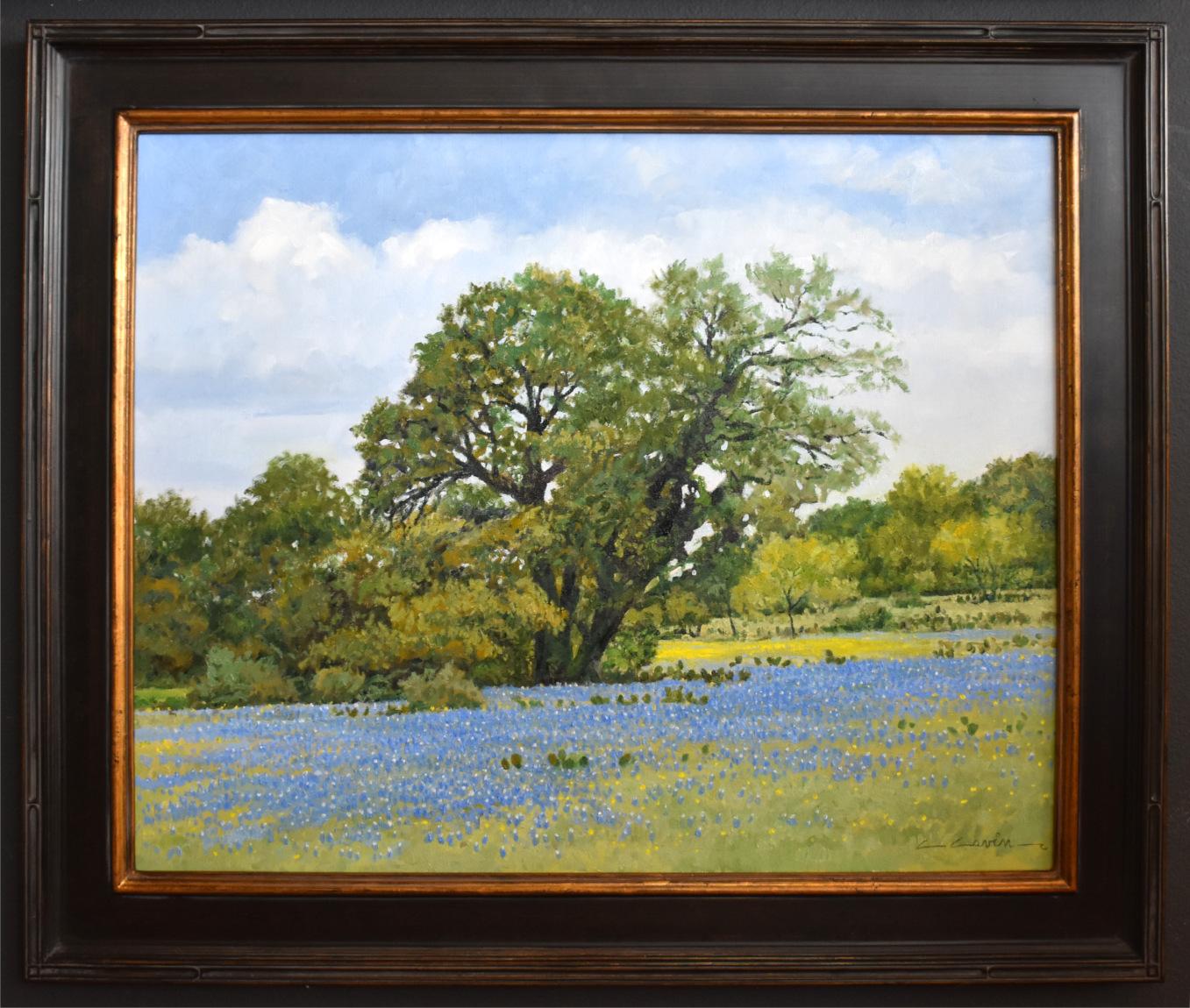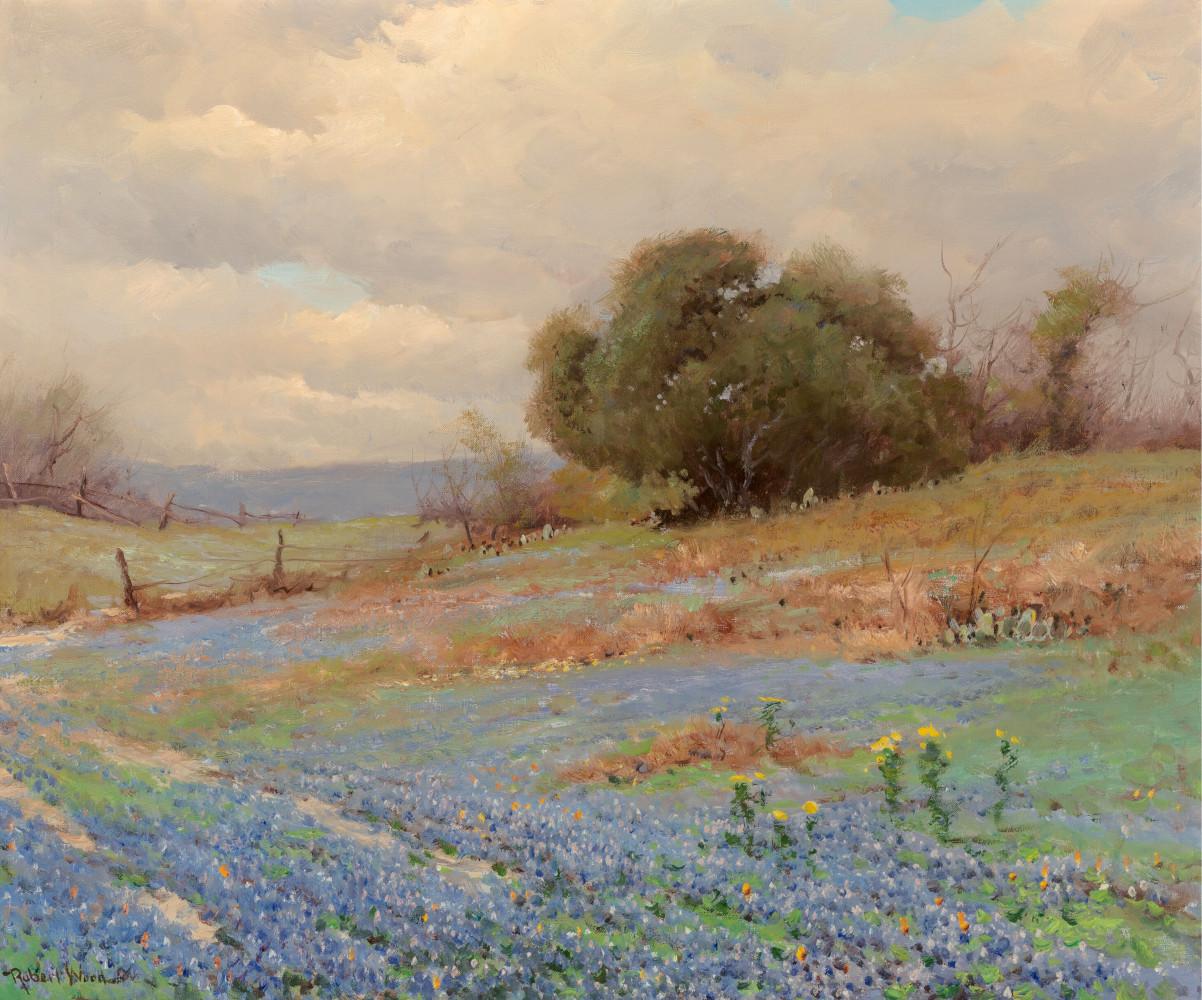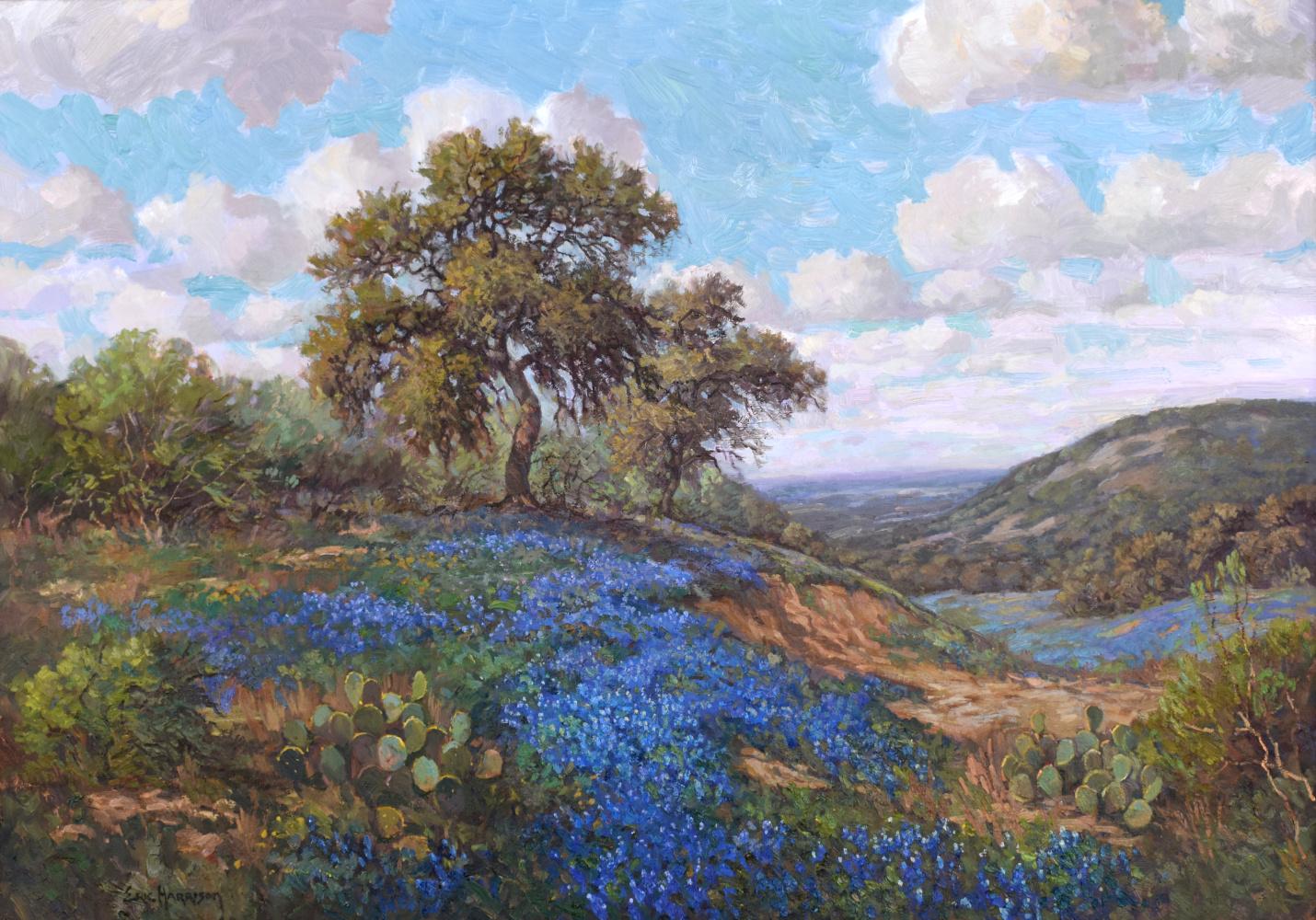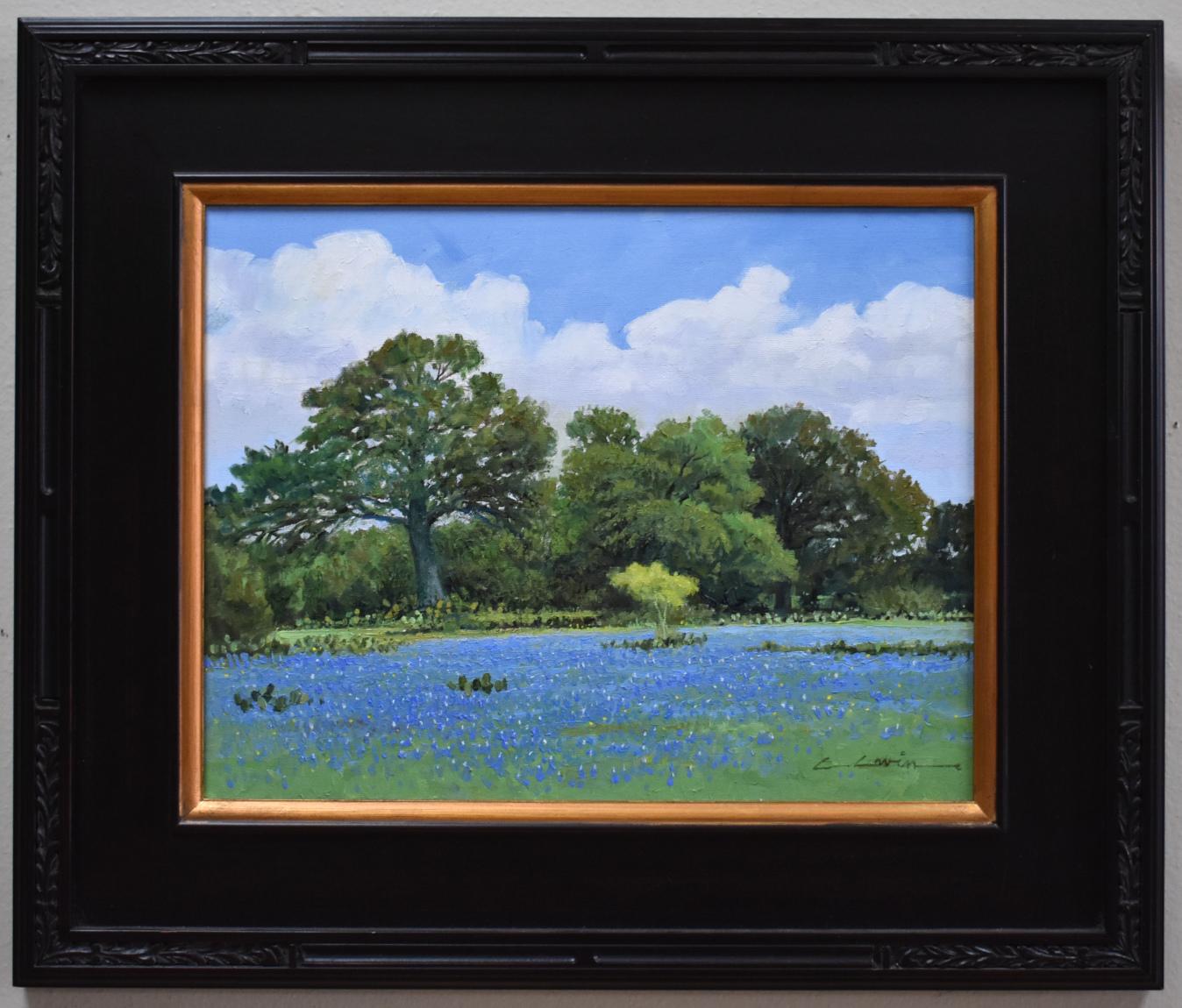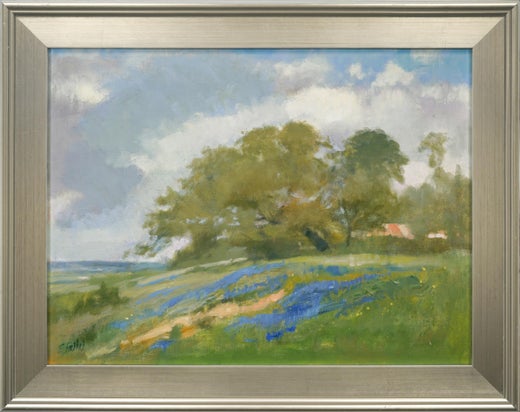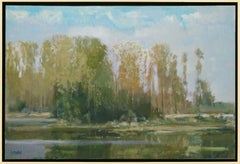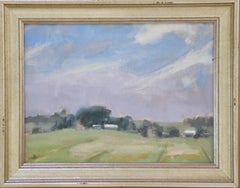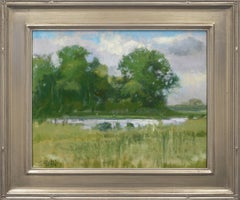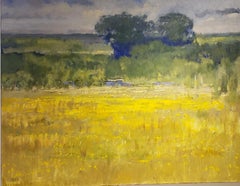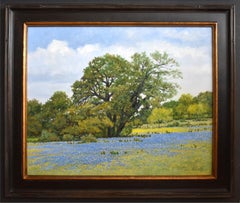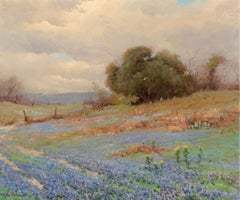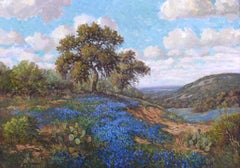Items Similar to Spring in Weimer Texas Hill Country Bluebonnets, Oil Texas Landscape 18" x 24"
Want more images or videos?
Request additional images or videos from the seller
1 of 10
Steve ParkerSpring in Weimer Texas Hill Country Bluebonnets, Oil Texas Landscape 18" x 24"2024
2024
$3,500
�£2,639.90
€3,049.12
CA$4,903.74
A$5,452.68
CHF 2,854.58
MX$66,605.49
NOK 35,870.56
SEK 33,743.45
DKK 22,761.44
About the Item
Spring in Weimer is painted from a plein aire study from a day in Weimar, Texas. This was painted in the spring when the bluebonnets are beginning to bloom. It is common for people to take weekend drives to these small towns to see the bluebonnets and eat at the small cafes.
Weimar is a city in Colorado County, Texas, United States. The population was 2,076 at the 2020 census. In 1873 the town was founded in anticipation that the Galveston, Harrisburg, & San Antonio Railroad was going to build through the site.
Steve Parker conveys his understanding of Texas landscapes and the use of native trees and flowers
It is common for people to take weekend drives to these small towns to see the bluebonnets and eat at the small cafes. Spring in Weimer by Steve Parker shows the rolling hills and the clouds that roll in later in the day . In the early evening the clouds turn dark and thunderstorms roll in the area. Many cattle gather under the trees to take a break from the Texas heat and go to a nearby pond.
Steve Parker's landscapes depict Brenham, Chapel Hill, Fredericksburg, Washington County and Lake Livingston. There is a feeling of recognition, of the familiar and yet of the elusive Texas landscape.
The visual space of the painting entices one to imagine the changing light and atmosphere on a Texas pond or a sudden mysterious ray of light across a clearing in East Texas.
By looking inward, Parker has created a view which Texas nature is constantly changing. Steve Parker's paintings have enough definition to become recognizable while retaining a loose painterly quality. The painting always bring the viewer back to Texas. Steve has been an Instructor at the Art League of Houston for over 30 years.
- Creator:Steve Parker (American)
- Creation Year:2024
- Dimensions:Height: 18 in (45.72 cm)Width: 24 in (60.96 cm)Depth: 1 in (2.54 cm)
- Medium:
- Movement & Style:
- Period:
- Condition:
- Gallery Location:Houston, TX
- Reference Number:1stDibs: LU1405215174852
Steve Parker
Wisteria is contemporary oil landscape painting on canvas 24 x 24 painted in 2020 by Texan artist Steve Parker . Steve Parker conveys his understanding of Texas landscapes and the use of native trees. Wisteria is a painting from a recent road trip to Fayetteville TX. Steve Parker's landscapes depict Brenham, Chapel Hill, Washington County and Lake Livingston. There is a feeling of recognition, of the familiar and yet of the elusive Texas landscape. The visual space of the painting entices one to imagine the changing light and atmosphere on a Texas pond or a sudden mysterious ray of light across a clearing in East Texas. By looking inward, Parker has created a view which Texas nature is constantly changing. Steve Parker's paintings have enough definition to become recognizable while retaining a loose painterly quality. The painting always bring the viewer back to Texas. Steve has been an Instructor at the Art League of Houston for over 30 years.
About the Seller
5.0
Platinum Seller
Premium sellers with a 4.7+ rating and 24-hour response times
Established in 1970
1stDibs seller since 2020
159 sales on 1stDibs
Typical response time: <1 hour
- ShippingRetrieving quote...Shipping from: Houston, TX
- Return Policy
Authenticity Guarantee
In the unlikely event there’s an issue with an item’s authenticity, contact us within 1 year for a full refund. DetailsMoney-Back Guarantee
If your item is not as described, is damaged in transit, or does not arrive, contact us within 7 days for a full refund. Details24-Hour Cancellation
You have a 24-hour grace period in which to reconsider your purchase, with no questions asked.Vetted Professional Sellers
Our world-class sellers must adhere to strict standards for service and quality, maintaining the integrity of our listings.Price-Match Guarantee
If you find that a seller listed the same item for a lower price elsewhere, we’ll match it.Trusted Global Delivery
Our best-in-class carrier network provides specialized shipping options worldwide, including custom delivery.More From This Seller
View AllSpring Cove Texas Landscape American Impressionism 24" x 36" Lake Conroe
By Steve Parker
Located in Houston, TX
Framed 26.5" x 37.5 "
Spring Cove is an impressionist landscape painting that was painted on Lake Cone located in Montgomery, Texas. Early Spring Cove is a contemporary oil landsc...
Category
2010s American Impressionist Landscape Paintings
Materials
Oil, Cotton Canvas
Homestead , Texas Landscape, 9.5x 11.5 Oil, Free Shipping, Hill Country
Located in Houston, TX
LOOK FOR FREE SHIPPING AT CHECKOUT. IF NOT AVAILABLE GALLERY OFFERS FREE SHIPPING.
The Homestead, Barns and Reflections paintings were painted in 2022 . They were painted in Texas and have custom made frames. All painted plein air in oil. All are Texas scenes, "Texas Hill Country" All are custom framed ready to hang.
Joan Breckwoldt...
Category
2010s American Impressionist Landscape Paintings
Materials
Oil, Linen
A Day at the George Ranch Texas Landscape Oil American Impressionism
By Steve Parker
Located in Houston, TX
Framed 22.5" x 26.5 "
A Day at the George Ranch is an impressionist landscape painting that was painted near Richmond TX which is about 30 miles from Houston. A Day at the George...
Category
2010s American Impressionist Landscape Paintings
Materials
Cotton Canvas, Oil
Texas Field , Texas landscape oil painting, Contemporary Impressionistic style
By Steve Parker
Located in Houston, TX
Texas Field contemporary oil landscape painting on canvas 30 x 40 painted in 2020 by Texan artist Steve Parker conveys his understanding of Texas landscapes and the use of native tr...
Category
2010s Impressionist Landscape Paintings
Materials
Oil, Cotton Canvas
$4,200 Sale Price
20% Off
On Comanche Hills Ranch, Texas landscape, oil painting, Texas Hill Country
By Judy Elias
Located in Houston, TX
On Comanche Hills Ranch is a Texas landscape located on a private Texas ranch. On Comanche Hills Ranch is located in the Texas Hill Countrywhere cacti and bluebonnets abound. This o...
Category
21st Century and Contemporary Impressionist Landscape Paintings
Materials
Oil
$2,240 Sale Price
36% Off
The Trees at the George Ranch Texas Landscape Oil American Impressionism
By Steve Parker
Located in Houston, TX
Framed 19.5" x 25.5"
The Trees at the George Ranch is an American impressionist landscape painting that was painted near Richmond TX which is about 30 miles from Houston. The Tree...
Category
2010s American Impressionist Landscape Paintings
Materials
Cotton Canvas, Oil
You May Also Like
" Bluebonnets San Antonio Texas " Texas Ranch Scene Texas wildflowers
By Charles Harvi Altheide
Located in San Antonio, TX
Charles Harvi Altheide
(1874 - 1951)
San Antonio Artist Texas, Kansas, Missouri
Image Size: 11 x 15
Frame Size: 23.5 x 27.5
Medium: Oil on Canvas
Dated 1941
"Bluebonnets San Antoni...
Category
1940s Impressionist Landscape Paintings
Materials
Oil
"SPRINGTIME BLUES" TEXAS BLUEBONNET TEXAS HILL COUNTRY
By CLIFF CAVIN
Located in San Antonio, TX
Cliff Cavin
Texas Artist
Size: 24 x 30
Frame: 30.5 x 36.5
Medium: Oil
2022
"Springtime Blues"
Biography
Cliff Cavin
Cliff Cavin, a native of San Antonio, Texas, is a landscape artist...
Category
2010s Impressionist Landscape Paintings
Materials
Oil
"APRIL" TEXAS HILL COUNTRY BLUEBONNETS IMAGE: 25 X 30 FRAME: 33 X 38 CIRCA 1940S
Located in San Antonio, TX
Robert Wood (G. Day)
(1889 -1979)
San Antonio Artist
Image Size: 25 x 30
Frame Size: 33 x 38
Medium: Oil
"April" Texas Hill Country Bluebonnets
Biography
Robert Wood (G. Day) (1889 -1979)
A painter of realistic landscapes reflecting a vanishing wilderness in America, Robert Wood (not to be confused with Robert E. Wood) is reportedly one of the most mass-produced artists in the United States. His painting became so popular he was unable to meet all of the demands, and many of his works were reproduced in lithographs and mass distributed as prints, place mats, and wall murals by companies including Sears, Roebuck. He was born in Sandgate, Kent on the south coast of England near Dover, the son of W.L. Wood, a famous home and church painter who recognized and supported his son's talent. In fact, he forced his son to paint by keeping him inside to paint rather than playing with his friends. At age 12, Wood entered the South Kensington School of Art. As a youth, he came to the United States in 1910, having served in the Royal Army, and he never returned to England. He traveled extensively all over the United States, especially in the West, often in freight cars, and also painted in Mexico and Canada. His itinerant existence took him to Illinois where he worked as a farmhand, to Pensacola, Florida where he married, briefly in Ohio, Seattle, Washington, and Portland, Oregon. In 1912, he was in Los Angeles, and in the late 1920s and early 1930s, in San Antonio, Texas, where he lived and in 1928 exhibited in the "Texas Wildflower Competition." From San Antonio, he gained a national reputation for his strong colored, dramatic paintings. Some of that prestige has been credited to his association with Jose Arpa, prominent Texas artist. Wood also gave art lessons, and one of his students was Porfirio Salinas. During this period, Wood sometimes signed his paintings G. Day or Trebor, which is Robert spelled backwards. In 1941 he went to California and painted numerous desert and mountain landscapes and coastal scenes. He lived in Carmel for seven years, and then moved to Woodstock, New York, but he soon returned to California, settling first in Laguna Beach, then San Diego, and finally in the High Sierras, where he and his wife built a home and studio near Bishop and lived until his death in 1979. Robert Wood was born March 4, 1889, in Sandgate, England, a small town on the Kentish coast not far from the white cliffs of Dover. His father, W. J. Wood, was a successful painter who recognized Robert's unusual talent. At the age of twelve, his father enrolled Wood in art school in the small town of Folkstone. He then attended the South Kensington School of Art. While attending art school, Wood won four first awards and three second awards, one each year, a record. In 1910 after service in the Royal Army, nineteen-year-old Wood and his friend, Claude Waters, immigrated to America. Initially, he settled in Illinois and worked as a hired hand on a farm belonging to Water's uncle. He would then strike out on his own, living the life of an itinerant painter. Wood traveled as a hobo, hopping freight trains and selling or bartering small paintings to support him along the way. When times were hard, he worked at whatever job was available. In this manner, he saw most of the United States and fell in love with rural America. By 1912, Wood visited Los Angeles for the first time, arriving on the day of the Titanic tragedy. Later that year, he had met, courted and married young Eyssel Del Wagoner in Florida. The couple moved to Ohio where a daughter, Florence, was born. During World War I, the family moved to Seattle where a son, John Robert Wood, was born in 1919. In the early 1920's, the young Wood family was almost constantly on the move. They stayed for short periods in Kansas, Missouri, California and for a longer time in Portland, Oregon, where Wood's friend Claude Waters had settled. Wood's seemingly endless wanderings disrupted his family life and delayed his development as a painter. However, through his travels he developed an appreciation for the American landscape that would inspire him for the rest of his career. Although aware of the current movement away from traditional realism in American art, he elected to travel that solitary path and remain true to his own vision of American’s grandeur and beauty poetically translated through his landscape and seascape paintings. In 1923, the Wood family discovered the beautiful city of San Antonio, Texas and it was there that he and his family would finally settle. He studied briefly at the San Antonio Art School with Spanish colorist Jose Arpa y Perea (1860-1952), who had arrived in San Antonio that same year. In the latter part of the 1920’s, Jose Arpa’s influence quickly became evident. Wood after several years of experimentation was becoming fine easel painter, capable of great subtlety with a new mature original style. Like Texas painters Robert Onderdonk (1853-1917) and his son Julian Onderdonk (1882-1922), Robert Wood concentrated on the distinctive Texas landscape with its Red Oak trees and wildflowers that covered the hill country landscape. He developed a reputation for his scenes of Blue Bluebonnets, the state flower. In the spring, the Texas prairie is covered with wildflowers, especially in the hill country surrounding San Antonio and Austin. Wood incorporated native stone barns and rough wood farmhouses that added authenticity and romance to his compositions. In 1925, Wood was divorced from his wife. In 1932, he moved to the famous scenic loop on San Antonio's outskirts. While still living in Texas, he took extensive western sketching...
Category
1940s Impressionist Landscape Paintings
Materials
Oil
"CERULEAN SPRING" BLUEBONNETS ERIC HARRISON, TEXAS HILL COUNTRY LANDSCAPE
By Eric Harrison
Located in San Antonio, TX
Eric Harrison
(Born 1971)
Texas Hill Country Artist
Image Size: 24 x 36
Frame Size: 33 x 45
Medium: Oil
2022
"Cerulean Spring" Bluebonnets
Biography
Eric Harrison (Born 1971)
“I went to the woods because I wished to live deliberately, to front only the essential facts of life, and see if I could not learn what it had to teach, and not, when I came to die, discover that I had not lived.”
-Henry D. Thoreau
Eric Harrison-born 1971 in San Antonio, Texas. In 1995 he married Kim Marie, and together they have two sons, Noah and Ethan. The Harrison’s reside in the hill country west of Blanco, Texas.
Currently painting in a language resonant with other Texas artists such as Robert and Julian Onderdonk, Robert Wood, Porfirio Salinas, Dawson Dawson-Watson, and Robert Harrison; with an affinity toward the work of California painter William Wendt. Paul Cezanne and many of the post impressionists.
Exhibitions and collections of his work include:
The United States Embassy in Togo, Africa
The University of Texas at San Antonio
The Buckhorn Museum San Antonio
Best of the Best Art Show Salado, Texas
Texas Landscape Show The Nave Museum, Victoria Texas
The Harrisons, “A Family of Texas Painters” Charles Morin...
Category
21st Century and Contemporary Impressionist Landscape Paintings
Materials
Oil
"Texas Farm Scene with Wildflower Meadow" Bluebonnets Tree Barn Spring Green
Located in Austin, TX
Oil on Canvas
Canvas Size: 12 x 16 in.
Frame Size: 18.25 x 22.25 in.
Signed, bottom right.
This vibrant landscape painting by Marlin Linville depicts a rustic farm scene bathed in t...
Category
21st Century and Contemporary American Impressionist Landscape Paintings
Materials
Canvas, Oil
"NEAR SAN SABA" TEXAS BLUEBONNET
By CLIFF CAVIN
Located in San Antonio, TX
Cliff Cavin "Near San Saba" Texas
Texas Artist
Size: 14 x 18
Frame: 22.25 x 26.25
Medium: Oil
2021
"Near San Saba"
Biography
Cliff Cavin
Cliff Cavin, a native of San Antonio, Texas,...
Category
21st Century and Contemporary Impressionist Landscape Paintings
Materials
Oil
More Ways To Browse
Weimar Art
Texas Hill Country Painting
Flower X Ray
Oil Paintings Texas Hill Country
Railroad Oil Paintings
Plein Aire Art
Bluebonnet Painting
Bluebonnets Landscape Paintings
Bluebonnet Oil Paintings
Texas Bluebonnets
Texas Bluebonnet Landscape Painting
Texas Bluebonnet Paintings
Texas Landscapes Bluebonnets
Bluebonnets Texas Hill Country
Cattle Drives
W J Roberts
Eye Of The Storm
Monet Giverny
